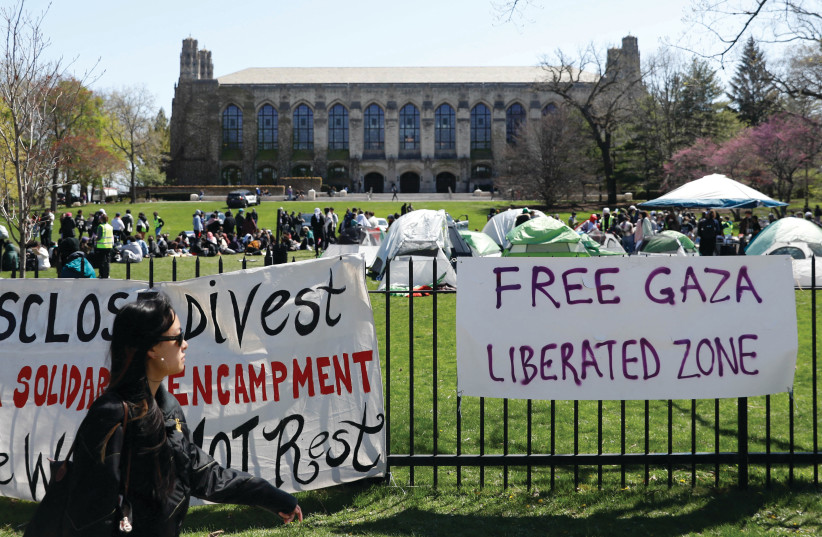The October 7 massacre and the immediate celebrations and protests that followed served as a wake-up call for a great many Israelis and Jews about the hatred of Hamas supporters in Gaza and in the United States. The world was much less secure than they had originally thought, so-called allies held knives behind their backs, and safety could only be won by one’s own hands.
On Thursday, US President Joe Biden confirmed that his administration was withholding weapon shipments to Israel as the IDF embarked on military operations against the last Hamas stronghold in Rafah. He charged that the IDF was attacking population centers, and restated his government’s opposition to a full-scale campaign to eliminate the terrorist group in the area.
As hostages are still being held in Gaza, Hamas’s leaders hope to survive the war to visit more massacres on Israeli civilians, and Iran and its proxies continue to bombard Israel from all directions, Biden’s betrayal serves as another wake-up call for Israelis and American Jews.
For Israelis, those who believed that Western powers could be relied upon for support are disillusioned. American promises of international camaraderie only lasts until patience wears thin and the turbulent weather of the election season becomes overcast.
Biden, like many other world leaders before him, defers to the safety of the status quo, even if it is actually untenable for those who are required to endure it. Israelis cannot afford to return to October 6 to await another October 7. While many Israelis disagree on the time frame and the hostage deals, there is a consensus that Hamas must be destroyed.
“If we need to stand alone, we will stand alone,” Prime Minister Benjamin Netanyahu said on Thursday night. “I have said that, if necessary, we will fight with our fingernails.”
This is not just a statement unique about Rafah. The sense that Israelis are the only guarantors of their own safety has deepened, as the world heaps on Israel double standards for warfare and unsustainable battle demands.
Biden’s “ironclad” support was made of tinfoil. Israeli trust of America, or at the very least the Democratic Party, will have been damaged by the president’s move.
Israelis will be slow to forget Biden’s decision, as will American Jews. This is not simply a matter of American Jews’ overwhelming support for Israel in the wake of October 7, but the US government’s capitulation to fringe societal elements that have been trading in violent pro-terrorist radicalism and antisemitism.
Increasing antisemitism in the US since October 7
Since October 7, American Jews have suffered increasing antisemitism – physical attacks, threats, derision, and ostracization. In March, almost 60% of US Jews were concerned about their safety because of their identity, according to an April poll by the Jewish Federations of North America.
This was before the intensification of protests the following month, with the economic blockades and the establishment of encampments across the country.
In mid-April, American Jews watched as their children were restricted from walking on their own campuses, lorded over by authoritarian activists supported by revolutionary factions in academia and civil institutions.
Americans watched as Jewish students were attacked and harassed, and as activists cheered for October 7, waved terrorist flags, and called for intifada and for all manner of evils.
While some institutions have taken action, the encampments have spread to over a hundred campuses worldwide, and the activists have only called to escalate their “student intifada.”
Biden’s response to what is happening has been tepid words. These words likely no longer mean anything to Jewish voters, who have seen the strength of his “ironclad” commitment. It buckles in the face of protest by radicals and the allure of the ballot box. The arms embargo was not implemented out of serious foreign policy or humanitarian concerns, but Biden’s personal election calculus.
Biden's decision is driven by political self-interest
An April Harvard-Harris Poll showed that 72% of Americans support an Israeli operation to finish off Hamas in Rafah, with 78% against Hamas’s continued control over Gaza, and 80% more supportive of Israel than Hamas.
The Gazan terrorist organization has a 64% unfavorability rating, and the Palestinian Authority 51%. The decision to block weapons trade with Israel is therefore not in the American interest or desire – it is based on Biden’s selfish attempt to court Muslim, Arab, and far-left voters in the presidential election swing state of Michigan.
These voters are not visible to American Jews, but the fringe radicals calling “hands off Rafah,” and “globalize the intifada” in the same breath are.
Biden’s embargo, whether directly a response to the protests or not, can be understandably perceived as such. As rhetoric of the “student intifada” escalates, American Jews may believe that the Democratic commitment to their safety and interests is as perfidious as its relationship with Israel.
October 7 backfired on those who perpetrated it, the wake-up call rousing Israeli society to bring down an “Iron Sword” of reckoning on the necks of Hamas and its members.
Biden’s arms embargo will also likely backfire with the resulting awakening.
Democratic diplomatic sway may wane with Israel, leading to difficulty in enacting foreign policy objectives. Without reliance on the steady flow of American weaponry, Israel will be forced to invest even further in its own domestic arms industry.
This will lead to challenges to America’s share of the arms market, and further reduce demand for the products of the American military industrial complex by Israel itself. Without the carrot of American munitions, general American diplomatic influence in Jerusalem will be diminished.
Yet as major Jewish organizations noted when they criticized Biden’s decision on Thursday, the chief impact on the United States would not be from Israel, but from other nations.
After Biden’s disastrous withdrawal from Afghanistan and the betrayal of Israel, allies may feel that they can no longer trust America as a steadfast partner. They may seek allies with greater resolve among Washington’s geopolitical rivals.
The purchase of American weapons, which sets militaries on a track to purchase compatible munitions, firearms and platforms, comes with the danger that the spigot could be turned off on a personal domestic whim. Strategic reliance on an unreliable supplier results in lost wars.
For enemies and rivals of the United States and its allies, the perception that America’s ironclad commitments are quickly pitted and rusted by time may lead them to engage in geopolitical risk-taking that will cause only more conflicts.
Perhaps the greatest backlash to Biden’s decision may come from the loss of the Jewish American vote. Prominent American Reform Rabbi Ammiel Hirsch cautioned the Democratic Party in April, even before the civil turmoil later that month: “Do not take American Jews for granted.”
“Be careful,” Hirsch warned during an April 12 sermon. “The results of the upcoming election do not only depend on Michigan.”
Hirsch said that many Jews had expressed anxiety to him about the Democratic Party.
Major Democratic Party donor Haim Saban reportedly sent an angry email to Biden that “there are more Jewish voters who care about Israel than Muslim voters [who] care about Hamas.”
While this remains to be proven, what is more likely to be true is that there are more pro-Israel Jewish voters who would have voted for Biden than pro-Hamas voters who would have voted for Biden. That is, the fringe elements in the encampments – and in Dearborn, Michigan – chanting “death to America” have likely not been swayed by Biden’s actions.
Michigan Rep. Rashida Tlaib and her like-minded colleagues have been demanding the end of military support for Israel since the war began, yet they have yet to issue a statement in support of Biden’s Thursday remarks.
National Students for Justice in Palestine; Within Our Lifetime; Palestinian Youth Movement; Samidoun; the Boycott, Divestment and Sanctions leadership and other organizations involved in the protests on American streets and campuses have been similarly quiet. IfNotNow called the move “a step in the right direction,” but castigated him for not acting sooner.
“Halt weapons transfers to the Israeli military now to prevent further massacres and mass graves in Rafah or anywhere else in Gaza,” said INN.
The young radicals and demographic groups that Biden has attempted to win over with his policy are not satisfied. They want nothing less than full ostracization of Israel, and have been decrying anything less as support for Zionists by “Genocide Joe.”
Come the election, Biden will likely have lost more Jewish votes with the arms embargo than he gained among those he had courted.

